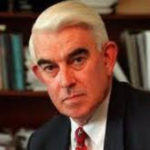JOHN KERIN. Trump’s latest Farm Bill and Implications for Australia’s Farm Exports.
Jul 1, 2019Trump’s trade policies and reaction to the rebound of them has resulted in another increase of $23b subsidisation on top of the $12b supposedly one-off package last year for US farmers who are ‘collateral damage, as a result of his policies. Put together, this represents two thirds of Australia’s total agricultural output.Do good allies damage Australian farmers like this ?
Prime Minister Morrison’s dinner with President Trump may have given us some assurance that our steel and aluminium exports won’t be hit by any additional, unilateral US action and that we are regarded as a ‘good ally’ and President Trump ‘looks after good allies’. From reports, the PM is saying the most sensible things on general multilateral trade policy and our officials at the WTO are commendably, protesting loudly about the latest US Farm Bill. Farm subsidisation by the agricultural exporting nations was supposed to be on the wane under the WTO. Comparative advantage is no longer seen as an element in the efficient production and trade of farm products and niche manufactures?
What currency does the Australia US Trade Deal, negotiated with the US by the Howard Government, now have as far as agriculture is concerned? Perhaps our beef exports to the US are safe but what of dairy, sugar and horticulture, the latter being two- way. Our wheat, grain and dairy exports (if we have any dairy) will find the going hard if US wheat, grains and dairy products are massively subsidised and inevitably find their way onto world markets.
However, the massive boost to US agricultural subsidisation, in reaction to China’s slackening of agricultural imports from the US, will cause ‘collateral damage’ to us and other agricultural exporting nations. Trump’s transactional approach in trying to drag China’s 200 million poorest down into penury, prevent Mexico from bringing the US economy to its knees (joke) and threatening to obliterate Iran for insulting him, is only more evidence of how unhinged US trade policy (sic) and its authors are becoming. Pulling out of the hard negotiated agreement with Iran on nuclear matters, just because Obama was heavily involved, hardly advanced much. Does Trump understand Persian history and how the US backed Iraq against Iran in supplying pre-cursor chemicals to Saddam, before we all happily invaded Iraq?
It is simply impossible to have exports balance imports nation by nation. The same applies to investment flows because nations are at different stages of development. The digital world we live in, where the major powers are busily hacking each other, and artificial intelligence is being worked on to improve robots, shows how illusory it is to fight trade wars using discriminatory blunt tariffs on the production of goods. The structure of work has changed dramatically and there is little sense in thinking that one country, no matter how powerful, can be dominant in the production of all goods.
The US is moving away from multilateralism. One aspect of this is that somehow the US now wants balanced trade with all its trading partners while at the same setting out to change the WTO, if not wipe it out, to suit the US alone; America has to be made great again at all our expense.
I am no longer au faitwith the detail of trade matters. The WTO established some rules based order on trade matters and I believe the Trade Related Intellectual Property (TRIPs) agreement and Trade Related Investment Measures (TRIMs) particularly suited US interests and enabled negotiations on contentious issues. Trump is not wrong about China and IP, but to use the tariff sledge hammer is going to be very destructive of world trade flows and lower world GDP growth. China’s rise on the 5G network shows it is not lacking in developing its own IP. If the US had invested more in education over the last decades, it would not have fallen behind in the ten technologies it once led the world.
One aspect of economic thinking is that everything is related to everything else and that the human factor always interferes with the theory. The same applies to trade. If you push the balloon in on one side, it bulges on the other. It appears that if Trump is successful in all of his unilateral, one-off, transactional deals and actions, we will have to develop new economic and trade theories and accept the US as theworld hegemon: but China, India, Europe, Japan?. There is a limit to how much you can make the already richest and most powerful country in the world the greatest when there are nearly 200 others.
The real problem I now have with the current US Presidency and administration is that all actions are posed to affect the short term issues of one economic variable as if it doesn’t affect any another variable. For example, Trump is urging the Fed to cut interest rates: taxes have already been cut. This increases asset prices, which boosts the share market and further entrenches the obscene levels of inequality in wealth in the US, without necessarily seeing a proportionate increase in investment.
There will be a long term cost in all this, including to the US environment, and I am no longer sure that the world can be relied upon to hold up the US $ as the world currency when it will be running an enormous budget deficit. As with the Australian economic situation, there is far more to be gained by demand side matters than supply side factors. The problem in both countries is the lack of consumer demand, not high taxes. The ARB agrees.
John Kerin, was once Minister for Trade and Overseas Development 1992-93.




